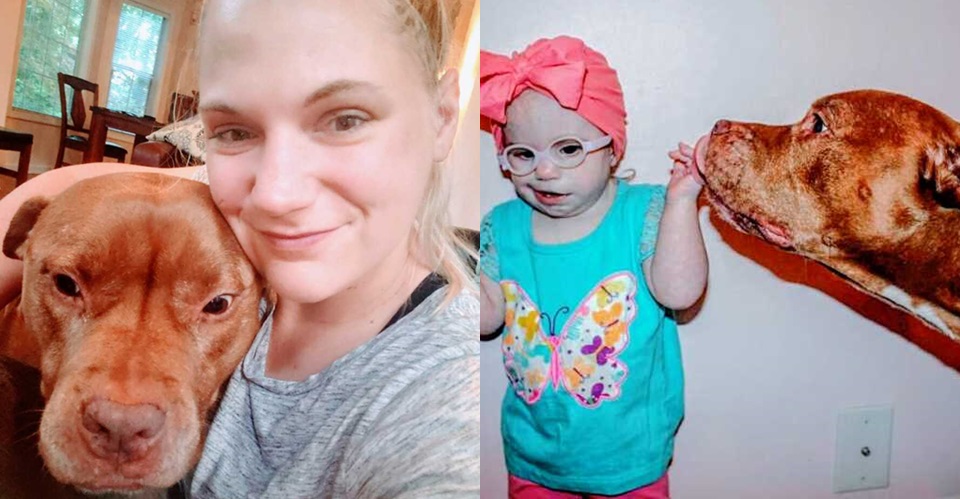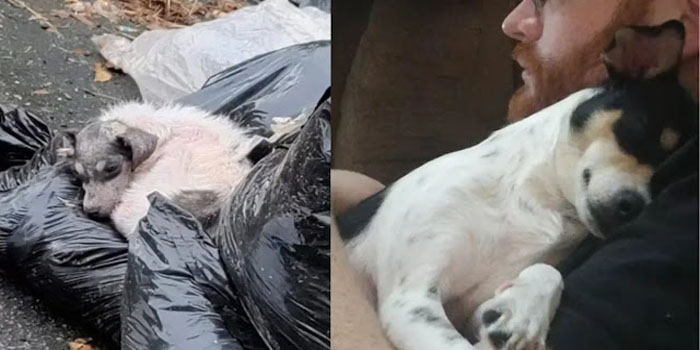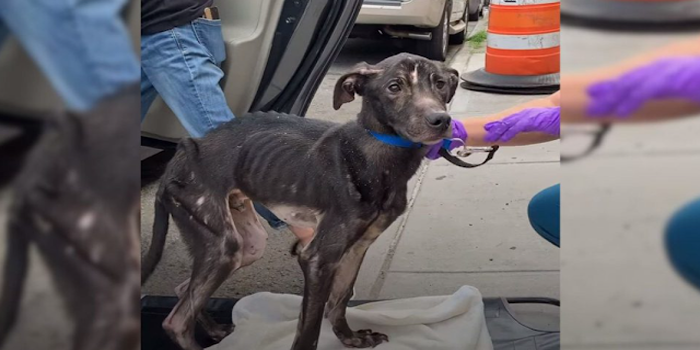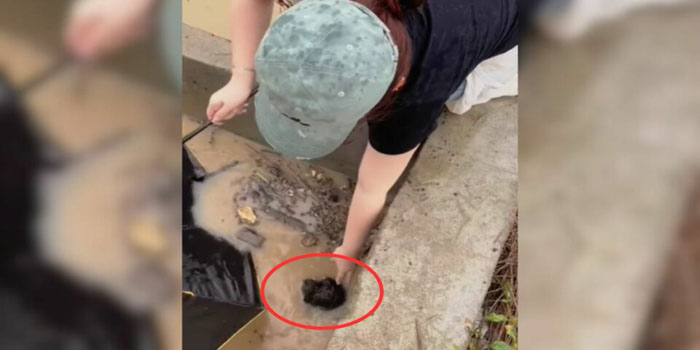A big red dog walked into their lives with a broken past and left them with a better one, because love didn’t ask where he’d been; it just let him stay. It was a blazing summer day in 2013 when a big red dog wandered down their street and changed everything. Patrick called from the porch of their first place, a modest townhouse in Fairburn, and she stepped outside to see him: massive, collarless, moving slowly. When she called, he ran right to her like he’d been looking for home all along.
Up close, he was a map of rope burns on his neck and legs, cigarette scars on his nose, torn ears, fresh bites crawling with gnats. Leaving him wasn’t an option. They brought him inside carefully. New baby, June was only eight weeks old, and made a plan: clean him up, shots, neuter, and find him a family. Shelters would likely put him down; rescues were full.

He acted like he’d never been in a house. Once she found him perched on a nightstand, he jumped through a window screen another time to “let himself out.” Still, he was gentle, and June adored him. They named him John, because if you already have a June, what else do you call the big, loyal one? The vet found heartworm, which is expensive and dangerous if ignored. Then Dr. Billy Watts stepped in and treated him for free. John pulled through, and they admitted what they already knew: he wasn’t leaving.
He was theirs. In his young, rowdy phase, he chewed a remote and a windowsill and once peed on Patrick’s side of the bed like it was a statement piece. But when Riley, the little boy who spent time with them, was around, John became a nurse. He checked Riley through the night, making quiet laps to be sure the kid was safe. Riley called him the most faithful dog he’d ever known.

When they moved to a new house, John and June settled into an old-married rhythm, gross, noisy kisses, and constant togetherness. Then their daughter, Georgia, was born with health needs that made everything feel fragile. They braced for trouble. Instead, John climbed onto the couch, sniffed the bassinet, and fell in love. From then on, he slept beside her until Patrick got home from work, trailed her in photos, and got scolded for second- and third-helping kisses. Once, he sprinted to her room seconds before her monitor alarmed, like he’d heard something no human could. If she were in a big-girl bed on the floor, he’d dash outside and rush right back to her side, unwilling to waste a minute.

The boys grew into teens and hid in their rooms; John would sit at the door and whine until he could check on them, too. He was huge but soft, his tail always wagging, and he was ready to climb into your lap and wash your face if you let him. They joked he’d greet a burglar with a grin. People warned them, “You don’t know with pits!” but John knew. He became the nanny dog: patient pillow, safety patrol, kiss dispenser. He was hers, and they were his. As he aged into a gentle old man, a new pup, Dolly, came home. June grumbled at first, but John took Dolly outside and showed her the ropes, where to sniff, how to play, like a teacher passing down secrets. Watching him, she wondered if he knew his time was short and was training his understudy.

Then came the night he tucked himself into a far corner of the yard and wouldn’t rise. Patrick carried him in. Dogs look for a safe place to go, they’ve been told. John chose Georgia’s room and lay down by her bed. He vomited as they tried to lift him. At the clinic, they learned a tumor had ruptured and bled into his belly. Surgery was risky, survival uncertain, and even success would likely buy only a few months with more tumors waiting. She felt that old grief open like a trapdoor. She wasn’t ready. But maybe John was. The boys were older. Georgia had Dolly and June. She herself had climbed out of some hard places. He had kept watch as long as he could. It was her turn.
They brought him in; he roused just enough to lay his big head on her arm. Without words, she told him what he had told them for nine years: it’s okay. You did a good job. We’re okay. He shifted, sighed, and went to sleep. John wasn’t “just a dog.” He was the red shadow in baby photos, the greeter at the vet for a spell, the holiday constant, the wet nose pressed against tears. He was the first to the door and the last to leave her side. He chose them when he ran down that street, and they did their best to give him a life that answered every wound he carried.

She told Georgia her guardian wouldn’t be there tonight, which split her open again. Still, she smiles when she looks at the chewed windowsill and the marked-up old recliner. He loved loud. He stayed close. He taught them not to judge a face, breed, or past. So, yes, hug your dog. Give the extra treat. And when it’s time to add another heartbeat to your home, rescue one who needs you. John proved every day that a second chance can turn a scarred stray into a family’s best story.











